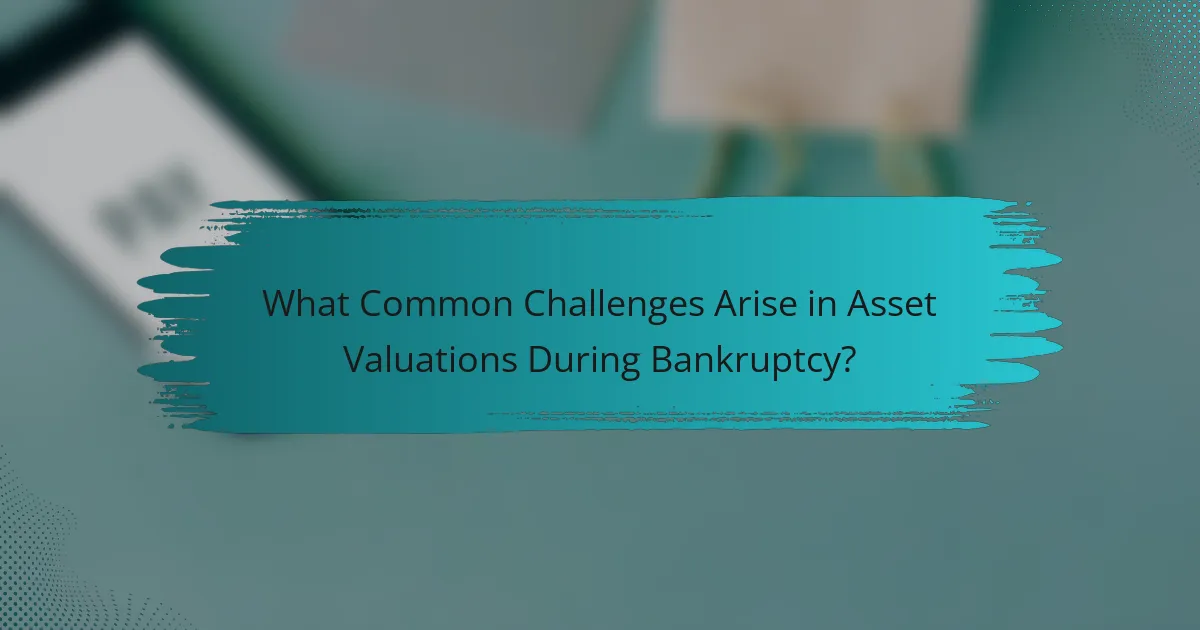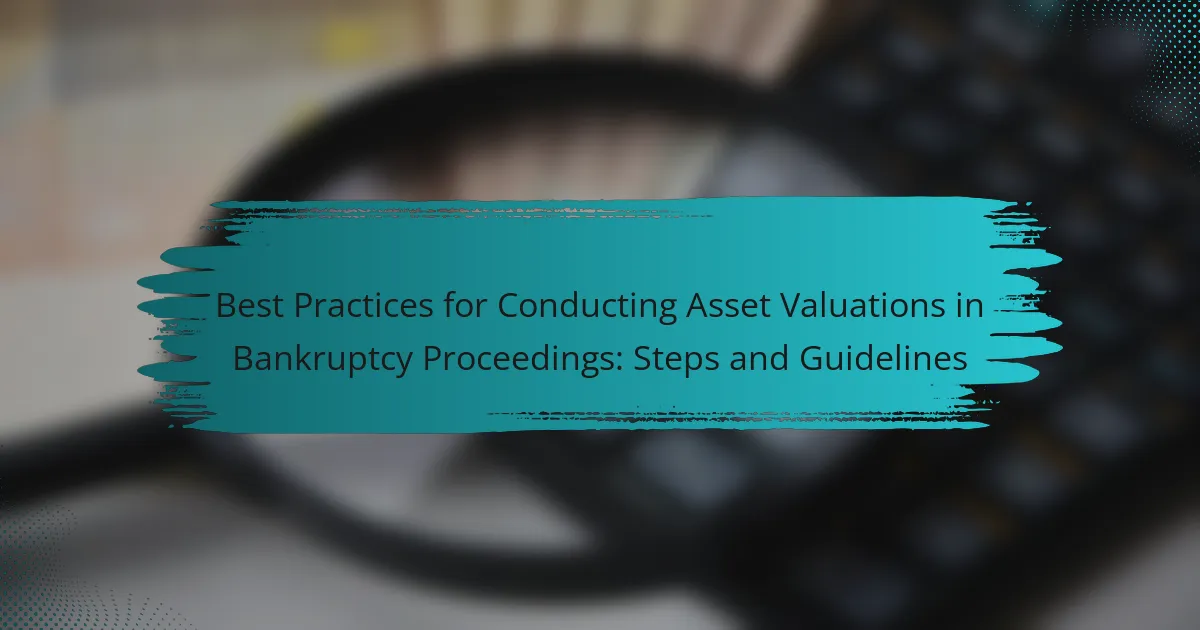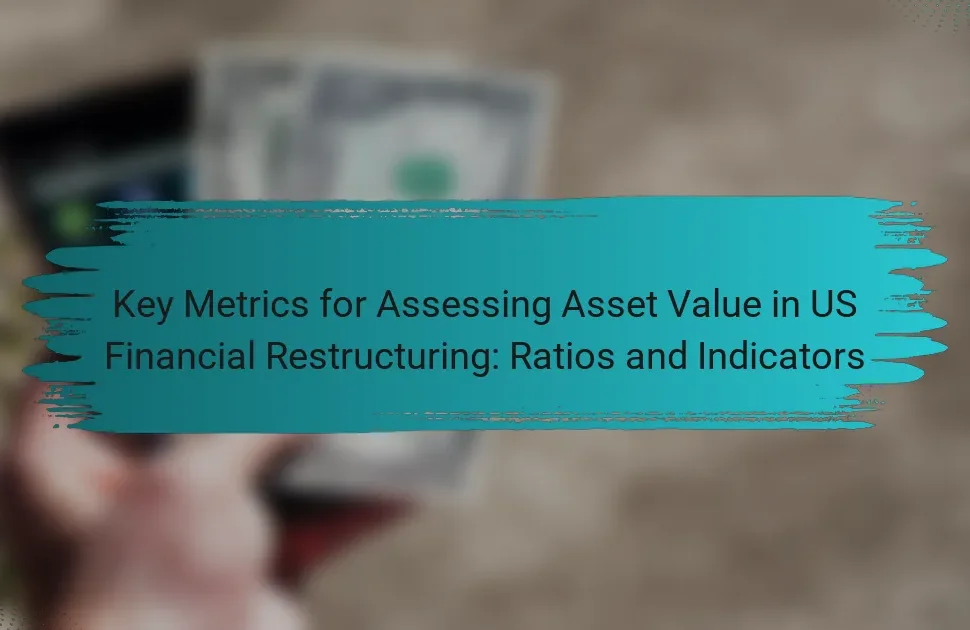Asset valuations in bankruptcy proceedings are critical for ensuring fair distribution among creditors and stakeholders. Best practices for these valuations include thorough documentation of financial records, engagement of qualified appraisers with bankruptcy experience, and adherence to established standards such as the Uniform Standards of Professional Appraisal Practice (USPAP). Utilizing multiple valuation methods—income, market, and cost approaches—provides a comprehensive view of asset worth, while regular communication with stakeholders enhances transparency. Key challenges in this process include market volatility, legal complexities, and the potential for incomplete information, all of which can significantly impact valuation outcomes.

What are the Best Practices for Conducting Asset Valuations in Bankruptcy Proceedings?
The best practices for conducting asset valuations in bankruptcy proceedings include thorough documentation, utilizing qualified appraisers, and adhering to relevant standards. Documentation should encompass all relevant financial records and asset details. Qualified appraisers must have experience in bankruptcy valuations to ensure accuracy. Adhering to standards such as the Uniform Standards of Professional Appraisal Practice (USPAP) is crucial for credibility. Additionally, engaging multiple valuation methods can provide a more comprehensive view of asset worth. Regular communication with stakeholders throughout the process enhances transparency and trust. Following these practices helps ensure fair and accurate valuations, which are essential in bankruptcy proceedings.
Why is Asset Valuation Important in Bankruptcy Proceedings?
Asset valuation is crucial in bankruptcy proceedings because it determines the value of a debtor’s assets. Accurate valuation ensures fair distribution to creditors. It influences the restructuring plan and affects negotiations with stakeholders. Courts rely on these valuations to make informed decisions. Misvaluation can lead to disputes and legal challenges. For example, undervalued assets may result in creditors receiving less than owed. Conversely, overvaluation can hinder the debtor’s ability to reorganize effectively. Therefore, precise asset valuation is essential for equitable outcomes in bankruptcy cases.
What role does accurate asset valuation play in bankruptcy outcomes?
Accurate asset valuation plays a crucial role in bankruptcy outcomes. It determines the fair market value of assets, which influences the distribution of proceeds to creditors. Accurate valuations help identify the true financial position of the debtor. This clarity can facilitate negotiations with creditors and improve the chances of a successful restructuring. Inaccurate valuations may lead to unfair distributions, increasing conflicts among stakeholders. Studies show that precise asset valuations can enhance recovery rates for creditors. For example, a report by the American Bankruptcy Institute indicates that accurate valuations can increase creditor recoveries by up to 20%. Thus, accurate asset valuation is essential for equitable bankruptcy proceedings.
How can asset valuation influence creditor recoveries?
Asset valuation directly influences creditor recoveries by determining the potential amount that can be recovered from a debtor’s assets. Accurate asset valuations provide a clear picture of the debtor’s financial situation. This clarity helps creditors prioritize their claims based on the estimated value of available assets. For example, if assets are undervalued, creditors may receive less than they are entitled to. Conversely, overvaluing assets can lead to unrealistic recovery expectations. In bankruptcy proceedings, precise valuations can guide the distribution of assets among creditors. According to a study by the American Bankruptcy Institute, accurate valuations can increase recovery rates by as much as 20%. This underscores the importance of thorough asset assessments in maximizing creditor recoveries.
What Steps Should Be Followed for Effective Asset Valuation?
Identify the assets to be valued. This includes tangible and intangible assets. Gather relevant financial data for each asset. Analyze market conditions affecting asset value. Choose an appropriate valuation method, such as cost, market, or income approach. Apply the selected method to calculate the asset value. Document all findings and assumptions made during the valuation process. Review the valuation for accuracy and consistency before finalizing.
What initial assessments are necessary before conducting asset valuations?
Initial assessments necessary before conducting asset valuations include identifying the type of assets involved. This involves categorizing assets as tangible or intangible. Understanding the current market conditions is also critical. Market conditions can significantly impact asset values. A thorough review of financial statements is essential. This review should include balance sheets and income statements. Assessing the legal status of the assets is another key step. Legal encumbrances can affect valuation outcomes. Lastly, determining the purpose of the valuation is vital. The purpose can influence the methodology used in the valuation process.
How do you determine the appropriate valuation methods for different assets?
Determining appropriate valuation methods for different assets involves assessing the asset type and market conditions. Common methods include cost, market, and income approaches. The cost approach evaluates the replacement cost of the asset. The market approach compares the asset to similar items sold recently. The income approach estimates future cash flows generated by the asset.
Factors influencing the choice of method include asset characteristics, purpose of valuation, and available data. For tangible assets, the cost approach is often preferred. For intangible assets, the income approach may be more suitable. Market conditions, such as supply and demand, also play a crucial role.
Regulatory guidelines and industry standards can provide additional context for selecting methods. For example, the International Valuation Standards Council outlines best practices for asset valuation. Adhering to these guidelines ensures consistency and accuracy in the valuation process.

What Guidelines Should Be Adhered to During Asset Valuations?
Asset valuations should adhere to established guidelines to ensure accuracy and reliability. First, use recognized valuation methods such as the income, market, and cost approaches. Each method provides a different perspective on value. Next, ensure compliance with relevant regulations and standards, such as the Uniform Standards of Professional Appraisal Practice (USPAP). This compliance reinforces the credibility of the valuation.
Conduct thorough due diligence by gathering all pertinent financial data and market information. This step is crucial for an informed assessment. Additionally, consider the purpose of the valuation, as it influences the approach and methods used. For instance, valuations for sale differ from those for litigation.
Consult with qualified professionals who have expertise in asset valuation. Their experience can enhance the reliability of the results. Finally, document all assumptions and methodologies used in the valuation process. This documentation provides transparency and supports the valuation’s findings.
How can one ensure compliance with legal standards in asset valuation?
To ensure compliance with legal standards in asset valuation, one must follow established guidelines and regulations. Adhering to the Uniform Standards of Professional Appraisal Practice (USPAP) is essential. These standards provide a framework for ethical and competent practice in valuation. Additionally, engaging certified professionals increases reliability and credibility. Documentation of the valuation process is also critical. This includes maintaining records of methodologies and data sources used. Regular training on legal updates and standards helps professionals stay informed. Furthermore, conducting independent reviews can identify potential compliance issues. These practices collectively ensure adherence to legal standards in asset valuation.
What are the key legal frameworks governing asset valuations in bankruptcy?
The key legal frameworks governing asset valuations in bankruptcy include the Bankruptcy Code and various federal and state laws. The Bankruptcy Code, specifically Title 11 of the United States Code, provides the primary legal structure for bankruptcy proceedings. It outlines the processes for asset valuation during liquidation or reorganization. Additionally, the Uniform Commercial Code (UCC) influences valuations by establishing standards for the sale of goods. The Federal Rules of Bankruptcy Procedure also guide the procedural aspects of asset valuations. Courts often rely on these frameworks to ensure fair and equitable treatment of creditors. Case law further shapes the interpretation and application of these legal standards in specific bankruptcy cases.
How do regulatory requirements affect the valuation process?
Regulatory requirements significantly impact the valuation process by establishing standards and guidelines that must be followed. These regulations ensure that valuations are conducted consistently and transparently. Compliance with these requirements helps maintain the integrity of the valuation process. For example, the Financial Accounting Standards Board (FASB) outlines specific guidelines for asset valuation. Adhering to these standards can influence the final value assigned to assets. Furthermore, regulatory requirements often mandate disclosures that affect how valuations are perceived by stakeholders. This can include the need for independent appraisals in certain situations. Ultimately, these requirements shape the methodologies used and the documentation provided during the valuation process.
What Ethical Considerations Should Be Taken into Account?
Ethical considerations in asset valuations during bankruptcy proceedings include objectivity, transparency, and integrity. Professionals must remain impartial and avoid conflicts of interest. They should disclose all relevant information to stakeholders. Accurate representation of asset values is crucial to ensure fair outcomes. Misleading valuations can lead to legal repercussions and damage reputations. Adhering to established ethical standards fosters trust among all parties involved. The American Institute of Certified Public Accountants (AICPA) provides guidelines that emphasize these ethical principles in valuation practices.
How can conflicts of interest be mitigated during asset valuations?
Conflicts of interest during asset valuations can be mitigated through several strategies. First, employing independent third-party appraisers is essential. These professionals provide unbiased assessments, reducing the risk of partiality. Second, establishing clear disclosure requirements for all parties involved is crucial. This ensures that any potential conflicts are identified upfront. Third, implementing a robust governance framework helps oversee the valuation process. This framework can include committees that review and approve valuations, adding an additional layer of scrutiny. Fourth, regular training on ethical standards for valuators promotes awareness of conflicts. Studies show that transparency and accountability significantly enhance the integrity of asset valuations.
What ethical standards should appraisers follow in bankruptcy cases?
Appraisers in bankruptcy cases should adhere to ethical standards that ensure objectivity, integrity, and transparency. They must provide unbiased valuations based on accurate data and thorough analysis. Appraisers should avoid conflicts of interest that could compromise their impartiality. They are required to disclose any relationships that may influence their judgment. Additionally, appraisers must comply with relevant laws and regulations governing bankruptcy proceedings. This includes adhering to the Uniform Standards of Professional Appraisal Practice (USPAP). Following these standards protects the interests of all stakeholders involved in the bankruptcy process. Ethical adherence enhances the credibility of appraisals and supports fair outcomes.

What Common Challenges Arise in Asset Valuations During Bankruptcy?
Common challenges in asset valuations during bankruptcy include lack of accurate information, market volatility, and legal complexities. Incomplete financial records often hinder precise valuations. Market conditions can fluctuate, affecting asset worth. Legal disputes may arise over asset ownership, complicating the valuation process. Additionally, emotional factors can influence stakeholders’ perceptions of value. These challenges can lead to significant discrepancies in asset valuation outcomes. Accurate valuations are critical for fair distribution among creditors and stakeholders.
What are the most frequent pitfalls in the asset valuation process?
The most frequent pitfalls in the asset valuation process include reliance on outdated data, overlooking market conditions, and misestimating cash flows. Using outdated data can lead to inaccurate valuations. Market conditions fluctuate and must be considered for accurate assessments. Misestimating cash flows often results from overly optimistic projections. Additionally, failing to account for liabilities can distort the asset’s true value. Inadequate due diligence can also lead to significant errors. Lastly, neglecting to involve qualified appraisers may compromise the valuation’s integrity. Each of these pitfalls can significantly impact the accuracy of asset valuations in bankruptcy proceedings.
How can inaccurate valuations impact the bankruptcy process?
Inaccurate valuations can severely disrupt the bankruptcy process. They can lead to misinformed decisions regarding asset liquidation or reorganization. Incorrect asset values may result in unfair distributions among creditors. This can create conflicts and prolong bankruptcy proceedings. Additionally, inaccurate valuations can undermine the court’s confidence in the process. A study by the American Bankruptcy Institute found that nearly 30% of bankruptcy cases involve disputes over asset valuations. These disputes can increase legal costs and delay resolutions. Ultimately, accurate valuations are crucial for a fair and efficient bankruptcy outcome.
What strategies can be employed to overcome valuation challenges?
Employing multiple valuation methods can effectively overcome valuation challenges. Utilizing approaches such as market, income, and cost methods provides a comprehensive view. Each method addresses different aspects of value, ensuring a balanced assessment. Engaging experts in the field enhances credibility and accuracy. These professionals can provide insights based on current market trends and historical data. Conducting sensitivity analyses helps identify key variables affecting valuation outcomes. This approach allows for better understanding and adjustment of assumptions. Documenting all processes and rationales ensures transparency and defensibility in valuation results. These strategies collectively enhance the reliability of asset valuations in bankruptcy proceedings.
What Best Practices Can Enhance the Asset Valuation Process?
Best practices that can enhance the asset valuation process include thorough data collection, consistent methodology, and expert analysis. Thorough data collection ensures all relevant information about the asset is gathered. This includes historical performance, current market conditions, and comparable asset sales. Consistent methodology involves applying the same valuation approach across similar assets. This can include income, market, or cost approaches. Expert analysis brings professional insight into the valuation process. Engaging appraisers with relevant experience increases accuracy. Regular updates to valuations reflect changing market dynamics. Utilizing technology, such as valuation software, improves efficiency and precision. These practices collectively contribute to a more reliable asset valuation process.
How can technology be leveraged to improve asset valuation accuracy?
Technology can be leveraged to improve asset valuation accuracy through advanced analytics and automation. Data analytics tools can process large datasets quickly and identify trends that human analysts might miss. Machine learning algorithms can refine valuation models by learning from historical data and improving predictions over time. Blockchain technology can enhance transparency and traceability in asset transactions, ensuring data integrity. Additionally, real-time data integration from various sources allows for up-to-date valuations. A study by Deloitte found that firms using technology in asset valuation reported a 30% increase in accuracy. These advancements lead to more reliable and efficient asset valuations in bankruptcy proceedings.
What are the benefits of engaging professional appraisers in the valuation process?
Engaging professional appraisers in the valuation process ensures accurate and unbiased assessments of asset values. Professional appraisers possess specialized knowledge and experience in asset valuation. They utilize established methodologies to determine fair market value. Their expertise minimizes the risk of overvaluation or undervaluation. Professional appraisers also provide credible documentation, which is essential in legal settings. This documentation can support decisions in bankruptcy proceedings. Furthermore, their objective perspective enhances trust among stakeholders. Engaging professional appraisers can ultimately lead to better financial outcomes in complex situations.
What Final Tips Should Be Considered for Successful Asset Valuations?
Ensure thorough research on comparable assets. This provides a benchmark for valuation accuracy. Utilize multiple valuation methods to cross-verify results. Common methods include market, income, and cost approaches. Document all assumptions and methodologies used. Transparency enhances credibility and defensibility of the valuation. Engage qualified professionals for complex assets. Their expertise can prevent costly errors. Regularly update valuations to reflect market conditions. This ensures relevance and accuracy over time.
The main entity of this article is asset valuations in bankruptcy proceedings. The article outlines best practices for conducting accurate asset valuations, emphasizing the importance of thorough documentation, qualified appraisers, and adherence to relevant standards like the Uniform Standards of Professional Appraisal Practice (USPAP). Key topics include the significance of accurate valuations for fair creditor distribution, the steps for effective valuation, guidelines for compliance with legal standards, and ethical considerations to mitigate conflicts of interest. Additionally, it addresses common challenges and pitfalls in the valuation process, while highlighting the benefits of engaging professional appraisers and leveraging technology to enhance accuracy.




